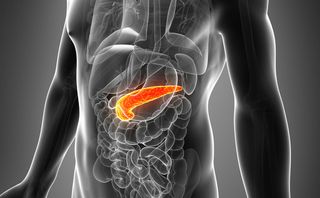Hormone Replacement Therapy May Reduce Pancreatic Cancer Risk

One type of hormone replacement therapy for postmenopausal women may decrease the risk of pancreatic cancer, a new study suggests.
In the study, women from California who took estrogen-only hormone replacement therapy for symptoms of menopause were 41 percent less likely to develop pancreatic cancer over a 14-year period than women who never took hormone replacement therapy.
Estrogen-only hormone replacement therapy (HRT) contains the female hormone estrogen by itself, as opposed to in combination with other hormones, such as progestin. Because estrogen by itself may increase the risk of uterine cancer, estrogen-only HRT is generally prescribed only to women who've had their uterus removed (a hysterectomy).
However, in contrast to the results with estrogen-only HRT, the study also found another type of estrogen-containing medication — birth control pills — were linked with an increased risk of pancreatic cancer when used over the long term. [7 Surprising Facts about The Pill]
Women who took oral contraception for 10 years or more had a 72 percent greater risk of developing pancreatic cancer than those who had never used oral contraception.
The study found associations, and cannot prove that estrogen — whether in hormone replacement therapy or birth control pills — actually causes an increase or decrease in pancreatic cancer risk. Factors not taken into account by the researchers may be responsible for the links.
In addition, pancreatic cancer is rare, so the risk of any woman in the study developing the condition was small.
Sign up for the Live Science daily newsletter now
Get the world’s most fascinating discoveries delivered straight to your inbox.
The reason for the opposite findings is not clear, the researchers said. But they speculate that the formulation and dose of estrogen in the different medications could play a role.
Many birth control pills contain estrogen in combination with progestin, while estrogen-only HRT contains only estrogens.
Some studies suggest that hormone replacement therapy reduces blood sugar levels and diabetes risk, two factors that may be important in the development of pancreatic cancer.
These effects were seeen for both types of studies hormone replacement therapy. But one study suggested that, while estrogen-only HRT is linked with reduced levels of insulin (a hormone that regulates blood sugar), the addition of progestin to the therapy countered this effect on insulin.
Another study found that use of oral contraception that contained both estrogen and progestin is linked to increased insulin levels.
More research into how estrogen and progestin effect pancreatic cancer risk is needed, the researchers said.
The new study involved more than 118,000 female public school professionals in California who were surveyed in 1995 to 1996 about their use of hormone replacement therapy and current or past use of oral contraceptives, and were followed until 2009.
At the start of the study, 60 percent of the women were postmenopausal, 25 percent of whom were current users of estrogen-only HRT, and 33 percent of whom were current users of estrogen-plus-progestin HRT. During the study period, 323 women (0.27 percent) were diagnosed with pancreatic cancer.
There was no link between the use of estrogen-plus-progestin HRT and pancreatic cancer risk. The age of participants at menopause, and whether they'd ever had children or breast-fed, were also not associated with pancreatic cancer risk.
The study, conducted by researchers at the University of Southern California, was published online Sept. 5 in the journal American Journal of Epidemiology.
Hormone replacement therapy containing estrogen plus progestin has been linked with an increased risk of breast cancer. Etrogen-only HRT has been linked with a decreased risk of breast cancer, although not all studies find this.
Follow Rachael Rettner @RachaelRettner. Follow LiveScience @livescience, Facebook & Google+. Original article on LiveScience.

Rachael is a Live Science contributor, and was a former channel editor and senior writer for Live Science between 2010 and 2022. She has a master's degree in journalism from New York University's Science, Health and Environmental Reporting Program. She also holds a B.S. in molecular biology and an M.S. in biology from the University of California, San Diego. Her work has appeared in Scienceline, The Washington Post and Scientific American.
Most Popular






